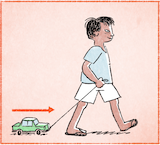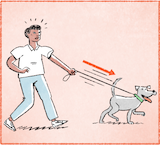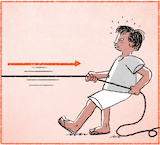


เขากำลังเฮ็ดหญัง เขากำลังดึงลด เป็นลดของเหล้น
เขาใซ้อี่หยังลาก เขาใซ้เซียก เขาดึงเซียกอยู่ เขาเอาเซียกมัดใส่ลดของเหล้นนั้น แล้วเขากะใซ้มือของเขาจับเซียกอันนั้น แล้วกะลากไป
ของเหล้นนี้กะเป็นลดของเหล้น เป็นลดของเหล้นเด็กน้อย ลดของเหล้นคันน้อยๆ ดอกว่า บ่สามาดขี่ได้ แต่ว่าสามาดเหล้นได้ ญู้เหล้น หลือลากเหล้นกะได้ สำหลับของเด็กน้อยเนาะ สำหลับของเด็กน้อยเหล้น
2
หมามันกำลังเฮ็ดหญัง หมามันกำลังดึงคนไปข้างหน้า
แล้วมันใซ้แฮงหลายบ่ จักคือกัน อันนี้กะบ่ฮู้คือกัน จักว่ามันใซ้แฮงหลายหลือบ่หลาย
แล้วพุใดไปก่อนไปลุน พุใดอยู่ข้างหน้า พุใดอยู่ข้างหลัง กะหมามันออกก่อน หมามันดึงคน แล้วคนอยู่ทางหลัง หมามันดึงคนไปข้างหน้า แล้วคนกะอยู่ข้างหลังหมา
ส่วนปะกอบของหมากะสิมีหลายอย่าง มีขาพ้อม กะมีขาหน้า ขาหลัง มีหู มีตา มีปาก มีดัง มีลิ้น มีสิ่งต่างๆ อีกหลายสิ่งหลายอย่าง
3
เด็กน้อยกำลังเฮ็ดหญัง เขากำลังดึงเซียก กำลังดึงเซียกไปทางหลัง
จักว่าเขาสิดึงเป็นหญัง เห็นแต่เขาใซ้แฮงดึงเซียกอยู่
ที่เขาดึงอยู่นั้นเป็นอี่หยัง เป็นเซียกแม่นบ่ แม่น เป็นเซียก เขากำลังดึงเซียก กำลังดึงเซียกอยู่
แล้วเขาใซ้แฮงหลายบ่ กะสิใซ้แฮงหลายเติบ เบิ่งซงแล้วเป็นตาใซ้แฮงหลายเติบ
แล้วที่เขาเฮ็ดอยู่นั้น ที่เขาเหล้นอยู่หนี้ เป็นกานละเหล้นแบบใด เป็นกานละเหล้นของอี่หยัง
อันนี้กะเป็นกานละเหล้นของเด็กน้อย หลือของพุใหญ่กะได้ เขาเอิ้นว่า เหล้นชักกะเย้อ เป็นเกมชักกะเย้อ เป็นเกมที่เหล้นของคนไทย คนอี่สานกะเหล้นได้ ซู่คนสามาดเหล้นได้
กะสิมีคนสองฝ่าย ฝ่ายหนึ่งอยู่ทางนี้ ฝ่ายหนึ่งอยู่ทางนั้น แล้วกะดึงเซียกกัน พุใดดึงซะนะ พุนั้นกะสิเป็นพุซะนะ
พุซะนะกะคือว่า ฝั่งใดที่ดึงเซียกได้หลายกว่า หลือดึงเซียกแฮงกว่า หลือมีพะละกำลังหลายกว่า ฝั่งนั้นกะสิเป็นพุซะนะ
Link to overview page
Link to dictionary
| Isaan | Pronunciation | Tones | Thai | English/Notes |
|---|---|---|---|---|
| เขา | khao | M | เขา | personal pronoun: he, she |
| กำลัง | gam-laŋ | M-HR | กำลัง | auxiliary indicating continuous or progressive action |
| เฮ็ด | het | H | ทำ | to do, to make |
| หญัง | ɲaŋ | M | อะไร, เป็นหญัง = ทำไม | 1. what {เขากำลังเฮ็ดหญัง = What is he doing?} {ธูปเอาไว้เฮ็ดหญัง = What are incense sticks for?} 2. something, anything, (nothing) 3. เป็นหญัง[...]คือ in initial position: why {เป็นหญังเขาคือใส่บักพิกลงไปในกวยเตียว = Why is he putting chili in [his] noodle soup?} {เป็นหญังหน้าต่างมันคือเปิด = Why is the window open?} {เป็นหญังมันคือมีควนไฟ = Why is there smoke?} |
| ดึง | dʉŋ | M | ดึง | to pull |
| ลด | lot | H | รถ | 1. car, motorized vehicle 2. vehicle, cart {ลดขายแนวกิน = food cart} |
| เป็น | pen | M | เป็น | 1. to be, to exist 2. to be able to 3. to suffer, sth. happens to 4. เป็นหญัง[...]คือ in initial position: why? {เป็นหญังเขากะคือแปงฟัน = Why is he brushing his teeth?} {เป็นหญังเคี่ยงบินมันคือสิตก = Why is the airplane falling down?} |
| ของเหล้น | khɔ:ŋ-len | M-LF | ของเล่น | toy |
| ใซ้ | sai | HF | ใช้ | to use |
| อี่หยัง | i:-yaŋ | H-M | อะไร | 1. what {นี้คืออี่หยัง = What is this?} {มื้อนี้เจ้าเฮ็ดอี่หยัง = What are you doing today?} {กินเข้างายกับอี่หยัง = What did you have for breakfast?} 2. something, anything, (in negations) nothing {บ่ต้องเฮ็ดอี่หยังอีกเลยนอกจากใส่ปุย = [we] don't need to do anything besides adding fertilizer} |
| ลาก | la:k | HF | ลาก | to drag, to tow |
| เซียก | si:ak | HF | เชือก | 1. rope, string 2. shoelace |
| อยู่ | yu: | H | อยู่ | 1. to be (located) at 2. yet, still 3. auxiliary indicating continuous or progressive action {ทอดปาอยู่ในกะทะ = (in the process of) frying a fish in the pan} {แม่กำลังเมี้ยนเฮียนอยู่ = mother is cleaning/tidying up the house} |
| เอา | ao | M | เอา | to take, to give {เขากำลังเอาก่องไปซั่ง = he's taking the boxes to weigh them} {หมอกำลังเอายาให้คนป่วยกิน = the doctor is giving medicine to the patient} {เอาไว้ถ้า = is for, is used for, has the purpose of} |
| มัด | mat | H | มัด | 1. to bind, to tie, to fasten, to wrap 2. clf. for bundles, bunches {มัดก้า = bundle of rice seedlings} |
| ใส่ | sai | H | ใส่ | 1. to put something in/on {เขาใส่บักพิกในกวยเตียวหลาย = he's putting a lot of chili in his noodle soup} {เขาบีบยาสีฟันใส่แปงสีฟัน = he squeezes toothpaste on the toothbrush} {ก่องเอาไว้ใส่ของ = boxes are there to put stuff in} 2. to wear (clothes) {เขาใส่เสี้ยแขนญาว = he's wearing a long-sleeve} 3. directed at {เอิ้นใส่กัน = to call each other/to say to each other} {หมามันเห่าใส่แมว = the dog barks at the cat} {ล้องเพงใส่ไม = to sing into the microphone} {เขากำลังซี้มือไปใส่พุซาย = she's pointing at the man} |
| นั้น | nan | HF | นั้น | that, there |
| แล้ว | lɛ:o | HF | แล้ว | 1. finished 2. already 3. and then, and next (especially แล้วกะ) 4. auxiliary for past tense |
| กะ | ga | M | ก็ | 1. then, consequently 2. also |
| มือ | mʉ: | HR | มือ | 1. hand 2. front leg/paw (e.g., of a cat) |
| ของ | khɔ:ŋ | M | ของ | of, belonging to |
| จับ | jap | M | จับ | 1. to grasp, to hold {เขาจับมือกัน = they're holding hands} {เขายืนจับไอติมอยู่ = she's standing, holding an ice cream} 2. to catch, to arrest {จับพุล้าย = to arrest a criminal} |
| อัน | an | M | อัน | 1. thing, object 2. general clf. for objects |
| ไป | pai | M | ไป | 1. to go 2. auxiliary indicating action extending into the future |
| นี้ | ni: | HF | นี้ | 1. this 2. here |
| เด็กน้อย | dek-nɔ:i | M-HF | เด็ก, เด็กน้อย | child |
| คัน | khan | HR | คัน | clf. for cars, trains, motorbikes, boats {ลดไฟคันนี้ = this train} {ลดเก็งคันสีเขียวคันน้อย = a small green car} |
| น้อย | nɔ:i | HF | น้อย | 1. few, little 2. small |
| ดอกว่า | dɔ:k-wa: | LF-H | ที่ว่า | as said before Notes: translation and tone to be verified |
| บ่ | bɔ: | H | ไม่ | 1. no, not 2. question particle, transforming a statement into a question Notes: spelling exception in line with common usage on social media |
| สามาด | sa:-ma:t | M-HF | สามารถ | can, to be able |
| ขี่ | khi: | H | ขี่ | to ride, to drive {ขี่มอเตอไซ = to ride a motorbike} {ขี่ควย = to ride on a buffalo} {ขี่เลีย = to take or travel on a boat} |
| ได้ | dai | HF | ได้ | 1. can 2. to get, to obtain 3. before verb: indicating past tense 4. บ่ได้ + verb: not |
| แต่ว่า | tɛ:-wa: | H-H | แต่ว่า | 1. but 2. only {ฮู้แต่ว่าเขายืนอยู่พุเดียว = I only know that he's standing there by himself} |
| เหล้น | len | LF | เล่น | 1. to play, to enjoy oneself with, to do something for pleasure {เหล้นลูกบอน = to play ball} {เหล้นเกม = to play a game/games} {เหล้นน้ำ = to play with/in the water} {นั่งเหล้น = to sit} {กินเหล้น = to eat (as a snack), to snack} {เหล้นโน่ดบุ่ก = to use a laptop (for entertainment or work)} 2. to drop by, to spend time with, to come to visit {บ่ได้มาเฮ็ดหญัง มาเหล้นซื่อๆ = I've not come to do anything in particular, I'm just dropping by} |
| ญู้ | ɲu: | HF | ผลักไปข้างหน้า | to push forward Notes: used with vehicles |
| หลือ | lʉ: | M | หรือ | or |
| สำหลับ | sam-lap | M-M | สำหรับ | for |
| เนาะ | nɔ | H | เนาะ | final particle: makes the statement softer, looking for agreement |
| หมา | ma: | M | หมา | dog |
| มัน | man | HR | มัน | it (also used to refer to people) |
| คน | khon | HR | คน | person, people |
| ข้างหน้า | kha:ŋ-na: | LF-LF | ข้างหน้า | in front, forward |
| แฮง | hɛ:ŋ | HR | แรง | 1. strong {ลมกำลังพัดแฮงอยู่ = to wind is blowing strongly} 2. loud {เสียงแฮง = loud} 3. strength, power |
| หลาย | la:i | M | เยอะ, มาก | many, much, very |
| จัก | jak | M | จัก | 1. answer to a question: [I] don't know, don't know exactly, [I'm] not sure {พุซายคนนี้เขาเถ้าไป่ จัก จักเถ้าหลือบ่เถ้า เบิ่งบ่ค่อยออก = Is this man here already old? I don't know. I can't see clearly whether he's old or not.} {เขาเว้ากันอยู่ใส จักคือกัน = Where are they talking? I don't know either.} 2. exact(ly), what exactly {จักต้มอี่หยังกะบ่ฮู้ = I don't know what (exactly) he is cooking} {บ่ลู้คือกันจักปาอี่หยัง = I don't know either what kind of fish this is} 3. how much/many? {ต้นไม้มีจักต้น = How many trees are there?} {ตอนนี้จักโมงแล้ว = What time is it now?} {มือของเฮานี้สิมีจักนิ้ว = How many fingers do our hands have?} 4. a bit, a little bit {จักหน่อย/จักหน่อยหนึ่ง = a bit, a little bit} |
| คือกัน | khʉ:-gan | HR-M | เหมือนกัน | 1. also, likewise, similarly {ยินดีที่ได้ฮู้จักคือกันคับ = Nice to meet you too!} 2. in negative sentences: either {บ่ลู้คือกัน = I don't know either} {จักคือกัน = I don't know (either)} |
| ฮู้ | hu: | HF | รู้ | 1. to know 2. to understand Notes: equivalent to ลู้ |
| ว่า | wa: | H | ว่า | 1. that, as {คำว่า X = the word X} 2. to say |
| พุใด | phu-dai | H-M | ใคร | 1. who {มีพุใดโทมากะบ่ลู้ = I don't know who has called} {ห้องนอนของพุใด = whose bedroom (is this)? } 2. someone, somebody, anybody, in negative context: nobody {บ่มีพุใดอยู่กับเขาเลย = there's nobody with him} |
| ก่อน | gɔ:n | H | ก่อน | 1. before 2. first, first of all |
| ลุน | lun | HR | หลัง, ท้าย | after, at the end |
| ข้างหลัง | kha:ŋ-laŋ | LF-M | ข้างหลัง | behind, in the back of |
| ออก | ɔ:k | LF | ออก | 1. to go out, to leave 2. out |
| ทางหลัง | tha:ŋ-laŋ | HR-M | ทางหลัง | backward, at/on the back (of) |
| ส่วนปะกอบ | su:an-pa-gɔ:p | H-M-LF | ส่วนประกอบ | component, element |
| สิ | si | M | จะ | future tense auxiliary {เขากำลังสิตื่น = he's about to wake up} {สิไปตะหลาด = [I'm] going to the market} |
| มี | mi: | HR | มี | 1. to have 2. there is |
| อย่าง | ya:ŋ | H | อย่าง | type, kind, sort, category |
| ขา | kha: | M | ขา | leg {ขาหน้า = front leg} {ขาหลัง = hind leg} {ส้งขาญาว = long trousers} |
| พ้อม | phɔ:m | HF | พร้อม | at the same time, also, too {มีตะเว็นพ้อม = the sun's out, too} {กะทะมีด้ามพ้อม = the pan has also a handle} |
| หน้า | na: | LF | หน้า | 1. front {ปะตูหน้า = front door} 2. face {เขากำลังล้างหน้า = he's washing his face} 3. auxiliary: conditional tense {เขาหน้าสิเป็นพุบ่าวพุสาวกัน = they are probably groom and bride} {กะหน้าสิส้มอยู่ = it's likely to be sour} 4. season {หน้าฮ้อน = hot season} 5. page 6. clf. for pages {เฮาอ่านฮอดหน้านั้นแล้ว = we've read until this page} |
| หลัง | laŋ | M | หลัง | 1. back, after 2. back (of body) {ขี่หลังควย = to ride on a water buffalo} 3. clf. for houses {บ้านหลังใหญ่ = a large house} {เฮียนไม้หลังเก่า = an old wooden house} |
| หู | hu: | M | หู | 1. ear 2. opening, hole, e.g., the hole a needle has to insert the thread 3. handle which has a hole, e.g., of a cup or pot |
| ตา | ta: | M | ตา | eye {เขามีตาสองข้าง = he's got two eyes} {หลับตา = to close one's eyes} |
| ปาก | pa:k | LF | ปาก | mouth |
| ดัง | daŋ | M | จมูก | nose |
| ลิ้น | lin | HF | ลิ้น | tongue |
| สิ่ง | siŋ | H | สิ่ง | thing, object |
| ต่างๆ | ta:ŋ-ta:ŋ | H-H | ต่างๆ | different, various |
| อีก | i:k | LF | อีก | 1. more, again 2. other, another |
| หลายสิ่งหลายอย่าง | la:i-siŋ-la:i-ya:ŋ | M-H-M-H | หลากหลาย, มากมาย, หลายอย่าง | varied, various, several (kinds etc.) |
| เห็น | hen | M | เห็น | to see |
| แต่ | tɛ: | H | แต่ | 1. but {แต่บ่ต่างกันหลาย = but not very different} {แต่บ่ลู้ว่าเขาญ่างมาแต่ใส = but [I] don't know where he's coming from, see also: แต่ว่า} 2. only {ตอนนี้มีแต่ขี้ฝ้า = now there are only clouds} |
| ที่ | thi: | H | ที่ | 1. that, which {คนที่ยืนอยู่ฝั่งขวา = the person which is standing on the right = the person standing on the right} {เว้าคำที่บ่สุพาบ = to speak words which are impolite = to speak impolitely} 2. for ordinal numbers {ที่สาม = third} |
| แม่นบ่ | mɛ:n-bɔ: | H-H | ใช่ไหม | question particle: ..., right? ..., isn't it? ..., don't you? etc. {เจ้าได้เห็นสิ่งนั้นแม่นบ่ = You've seen that, haven't you?} {ฝนกำลังตกแม่นบ่ = It's raining, isn't it?} {นี้คือกะคุแม่นบ่ = This is a bucket, isn't it?} |
| แม่น | mɛ:n | H | ใช่ | 1. yes 2. affirmative particle |
| หลายเติบ | la:i-tə:p | M-LF | many, much, very (more intense than หลาย) | |
| เบิ่ง | bəŋ | H | ดู | 1. to look at, to see, to watch {เบิ่งโทละทัด = to watch TV} {เบิ่งหนัง = to watch a movie} 2. to guess {เบิ่งซงแล้ว ... = [I] guess / from what it looks like ...} |
| ซง | soŋ | HR | ทรง | 1. shape, form 2. as if, like Notes: translation to be confirmed |
| ตา | ta: | M | ตา | as a prefix: likely, worthy, fit for (like Thai น่า-) {ตาฮัก = lovely/cute} {ตาสะออน = praiseworthy} {ตาหวาน = (of ice cream) [likely to be] sweet} {ตาอยู่ = to be a good place to be} Notes: see also various entries for ตา-, e.g., ตาแซบ, ตาพู่ฮ้าย, ตาย้าน, ตาอยากหัว, ตาฮัก, ตามีแฮง |
| หนี้ | ni: | LF | นี่ | here |
| กาน | ga:n | M | การ | prefix indicating the action of ... |
| ละเหล้น | la-len | H-LF | ละเล่น | game, play |
| แบบ | bɛ:p | LF | แบบ | 1. example, model, kind 2. style, form, pattern, design |
| ใด | dai | M | ใด | 1. which, that one which, what, how {เขานั่งแบบใด เขานั่งขดตะหมาดอยู่ = How is he sitting? He's sitting cross-legged.} {ตอนใด = when?} 2. whichever, whoever {หม้องใดหม้องหนึ่ง = some place, somewhere} {ขั้นเฮาอยากตื่นญามใด เฮากะตั้งเวลาปุกญามนั้น = If we want to get up at a certain time, we set the alarm to that time} Notes: sentence-final often with a marked rising tone |
| พุใหญ่ | phu-ɲai | H-H | ผู้ใหญ่ | adult, elder |
| เอิ้น | ə:n | HF | พูด, เรียก | to call, to say {เอิ้นง่ายๆ ว่า = in other words} {คนอี่สานเอิ้นว่า เป็นลูกคนกก = Isaan people call her ลูกคนกก} |
| ชักกะเย้อ | chak-ga-yə: | H-M-HF | ชักเย่อ | tug-of-war |
| เกม | ge:m | M | เกมส์ | game |
| ไทย | tha:i | HR | ไทย | Thai {ปะเทดไทย = Thailand} {คนไทย = Thai (person)} |
| อี่สาน | i:-sa:n | H-M | อีสาน | Isaan {คนอี่สาน = Isaan person} |
| ซู่ | su: | H | 1. all, entire 2. every, any {ซู่พุซู่คน = everybody} {ซู่สิ่งซู่อย่าง = everything} {ไก่ต้องกินเข้าซู่มื้อ = chicken need to eat every day} {ซู่คนสิมีขาเอาไว้ถ้าญ่าง = everybody has legs to walk} |
|
| สอง | sɔ:ŋ | M | สอง | two |
| ฝ่าย | fa:i | H | ฝ่าย | side, group, faction |
| หนึ่ง | nʉŋ | H | หนึ่ง | 1. one 2. after adjective: intensifier {บักคักหนึ่ง = very much} {อันบักใหญ่หนึ่ง = very large}, or attenuates the meaning {กะดาดมันแผ่นน้อยๆ หนึ่ง = the piece of paper is [relatively] small} |
| ทาง | tha:ŋ | HR | ทาง | 1. way, direction {พุหญิงกะสิไปทางหนึ่ง พุซายกะสิไปอีกทางหนึ่ง = the woman goes one way, the man another way} {ตะเว็นไปทางใด = Where has the sun gone?} {เขาถีบจักกะย๊านไปทางหน้า = he's biking on/onward/forward} {มาเว้า มาว่าเฮาในทางที่บ่ดี = he's scolding [me], he's talking to me improperly} 2. by, through, via etc. {เว้าทางโทละสับ = to talk on the phone} |
| กัน | gan | M | กัน | mutual, each other, with another, together {เขากำลังนั่งเว้ากัน = they're sitting and talking} {เขาสองคนฮักกัน = they love each other} {ปาสองโตนี้ ใหญ่ห่างกันหลายบ่ = These two fish here, are they very different in size (from each other)?} {ต่างกัน = to be different (from each other)} {ก่องอันไหนหนักกว่ากัน = Which box is heavier (than the other(s))?} |
| ซะนะ | sa-na | H-H | ชนะ | to win, to defeat, to overcome Notes: pronunciation: also realized as ชะนะ |
| พุ | phu | H | ผู้ | 1. person 2. clf. for people {พุหญิงพุหนึ่ง พุซายพุหนึ่ง = a woman, a man} {ซู่พุซู่คน = everybody} {พุหนึ่งโตจ่อยๆ พุหนึ่งโตบักอ้วนหนึ่ง = one person is slim, the other is fat} Notes: pronunciation: also realized as พู่- |
| คือ | khʉ: | HR | คือ | 1. to be, to resemble, like, as 2. why {บักหล้าคือบ่เก็บโต่ะแน่ = [addressing a young boy] Why haven't you cleared the table?} |
| ฝั่ง | faŋ | H | ฝั่ง | 1. side 2. river/canal bank, shore |
| กว่า | gwa: | H | กว่า | more, more than, comparative: as, than |
| พะละกำลัง | pha-la-gam-laŋ | H-H-M-HR | พละกำลัง | strength |